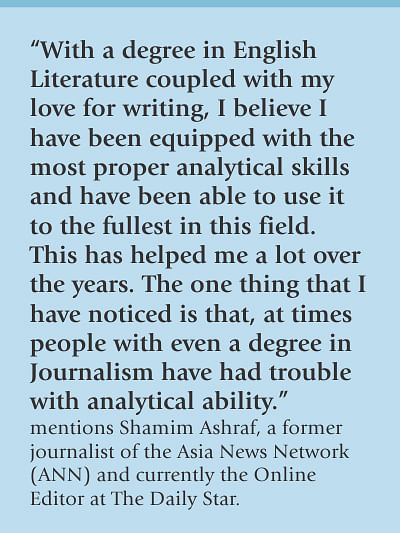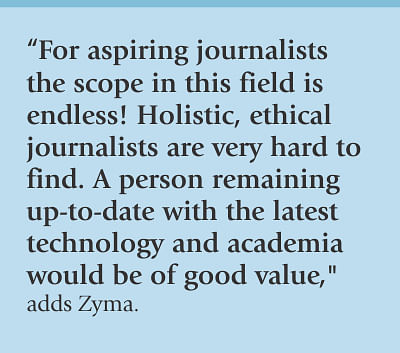Road to journalism

"I am Christian Amanpour from London and THIS… is CNN"
As I sit in complete awe of this particular Chief International Correspondent, at least a hundred questions fly through my head: Will I be able to match up to her one day? Am I making the right decision? Will I even survive? Then I slap myself out of my thoughts and focus: She survived… No, she dominated… If she can make it, why can't I?
If you are an aspiring journalist like me, you will be bombarding yourself with questions and self-doubt every step of the way. Moreover, other people will be questioning you too. And things aren't made any easier with the trying situation of our dear nation. So why bother to continue in this field? I did some digging, talked to some people and found a simple answer: For the love of others and the self-satisfaction that this job can give.
First thing's first
Motivation is important. Very important in fact because it's the only thing separating you from giving when the going gets tough (which is more than often in this field). Work may be dry, or unrewarding. While there is no one road to journalism, different people have different reasons that drive them, motivate them. They may have humble beginnings, difficult ones, rebellious ones. One may never realize this is what they'll devote their life to, but are touched by a particular issue. But once you discover your source of motivation, the trick is to constantly remind yourself what's so important, what drives you.
Forbes Magazine's staff reporter Jenna Goudreau says she loved telling stories, and eventually to write, even before she could read.
"When I started asking more practical questions—how do I earn money with my skills?—journalism seemed obvious. You get to learn every day, meet interesting people, write and speak about new ideas, and occasionally get a sweet swag bag. I can never answer for people when they ask 'How do I know I love this?' But if you choose to pursue this field, you'll need to have talent and passion to ride out the hard times" she adds.
However, like always, not everyone is as sure as Jenna was. But in a country like ours where nearly everyone has a political opinion, journalism is a very approachable profession. Many of the renowned journalists of our time are not even full time journalists. Many write for newspapers in their free time while maintaining their full time careers. For example, renowned writer Assadullah Khan started writing editorials for The Daily Star while he was still a professor at BUET.

The learning curve
I do emphasize on the fact that there is no set formula in journalism and that as a field, it is open, very broad and allows for creativity. It cannot be contained into just one job description either and if you're truly dedicated, you'll enjoy the flexibility. It can be as hard and taxing as it can be fun and educational. The challenges faced in this field can be a learning process in itself as one will need to constantly update oneself on current affairs and absorb a tremendous amount of information.
When entering this field you will not be immediately recognized for your work, adding to the fact that as you build your position over time, your work will be subjected to creative criticism and judgement. As a freelancer myself, I remember my first published work not even being credited as my own.
If you are working in the print media side of journalism, one of the other issues that you will have to deal with is publication droughts. This can be as frustrating as it tests a journalist's patience and dedication brilliantly. It is considered essential, to handle such situations when it comes to training oneself, particularly since journalism is a doing field. Learn to talk to people, distinguish trends, arrange your research and convey it in an appealing manner.
Also, when you're still a student, it is advised to take as varying courses as possible since this allows you to diversify and gives you an edge over others when it comes to in-depth reporting.
"As an Asian Studies major, the only reason I chose this subject is because of its diversity as it helped me to gain a wide range of knowledge. The diverse selection of courses that I could choose from helped me in drastic measures." says Zyma Islam, an alumni of Asian University for Women, and a journalist-reporter.
Make use of what and who you have
Look around. There are people you know who can offer an their insights, and opportunities to write and get published abound. "In terms of the process of getting a job and moving up the ladder, I always advise starting early. By the time I was a university graduate I had internships with major magazines, wrote for my school paper and freelanced. That meant when I started looking for full-time salaried jobs I had a portfolio of work and work experience at big brand names, which definitely paid off in the end. Some people make mid-career switches to journalism and are successful, but I believe the earlier you start and succeed, the higher you're likely to rise," commented Jenna.

Also, journalism is all about your connections and relationships. Make sure to secure good relationships with your mentors, professors, colleagues, and peers since they can always introduce you to the right people when it comes to work. The relationships you make with people will ensure that they will eventually advocate for you in the future in any work related issue. You must not underestimate how handy the people you know may prove to be, as I can tell from my own experiences.
You'll be relieved to know
The level of competition in this field is sky-high, particularly since it is seen to be a contracting field. However, the need for good, unbiased and accurate reporting of news it seems is more important than ever.
Shamim believes, "The scope in this field is still very big. If equipped with the proper skills and experience, a journalist will always be in demand. I have known journalists from Bangladesh who are now working in esteemed news organizations like The New York Times, The Wall Street Journal, Associate Press (AP) and so on."
The payoff
If the ferocious competition and a (mostly) contrasting salary in this field put most people off, then the serious emotional stability that one needs to face the low lows in this field will completely obliterate them. One has to be really good at what they do and have the ability to adjust to the industry, which is changing by the minute. However, at the end of the day, the experiences that one gets in this field are without a wholly and utterly satisfying. As any journalist will attest, the rewards are boundless – from the first time you see your work in print, or the first time you cover an event of local or national or international importance, the respect you garner and the fulfillment you feel are second to none.
What you can do right now
- Freelance for newspapers
- Start a blog (e.g. Tumblr, Wordpress, WorldPulse, etc)
- Write for the publication by your School/College/University.
- Take part in campaigns and competitions (e.g. St Gallen's Youth Institute Essay Competition, Commonwealth Essay competition, Shankar's Essay Competition, Voices of our Future -World Pulse, etc)
- Do an internship for an organization that interests you. Take up a position that's writing-intensive.

 For all latest news, follow The Daily Star's Google News channel.
For all latest news, follow The Daily Star's Google News channel. 



Comments